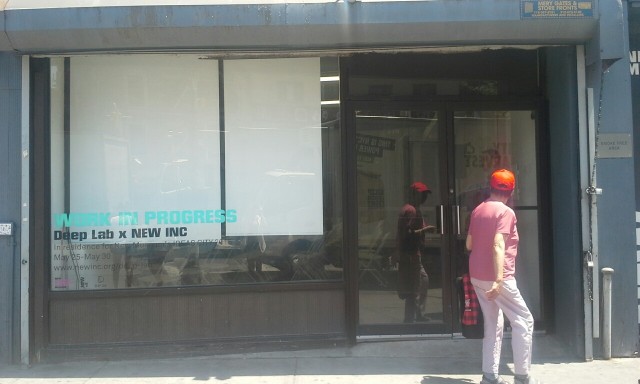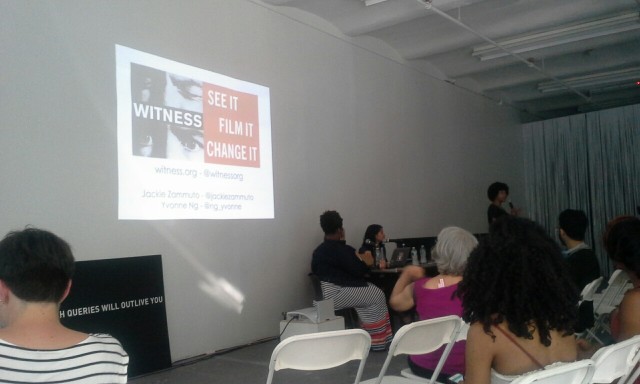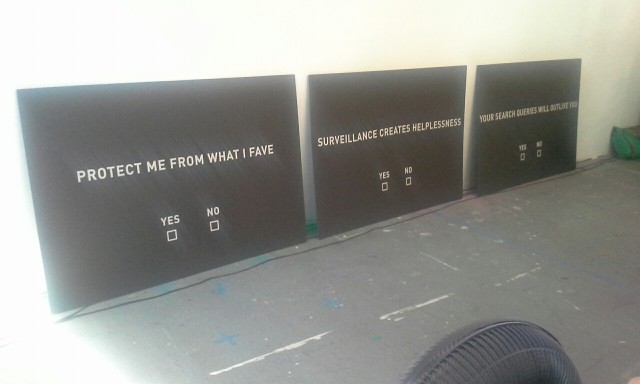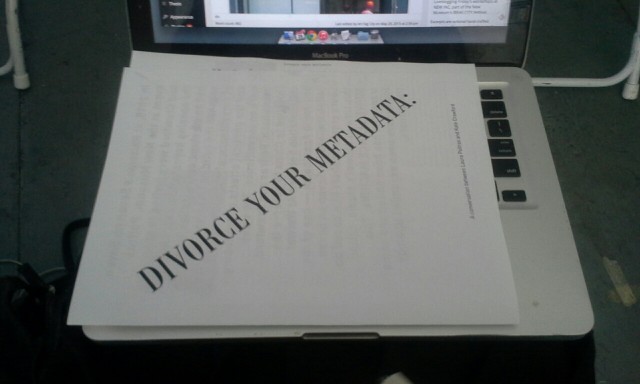
Just a curious onlooker outside NEW INC
Surveillance culture takes the stage at NEW INC, an art and tech residency at the New Museum. This week, the all-female research collective Deep Lab has been brought in for the museum’s IDEAS CITY—the New Museum loves all caps—a festival loosely centered on exploring the future of the city.
With today’s Deep Lab workshops and panels, the “city” focus zooms in to the “citizen.” This morning’s workshop focused on apps and software anyone can use to reduce the risk of surveillance, and this afternoon we’ll see panels devoted to anti-utopias, user-generated content, and, of course, more surveillance.
Let the countdown begin…
[Recent comments come first]
Strategic Witnessing
Moderator: Harlo Holmes
Speakers: Sydette Harry, Yvonne Ng, Chris Tse, Addie Wagenknecht, Jackie Zammuto

Witnessing panelists
5:45 p.m. The conversation turns to issues of consent. As a journalist, blogger, and art critic (they’re not all the same thing), I feel like I have to bring up my own conflicts about recording and surveillance—heck, right now, I’m recording events. This is a public event, but if I asked every single person before the workshop took place if they’d be okay with it being recorded for posterity—which I think is incredibly important for journalists, whether citizen-witnesses or professionals, to do—I doubt everyone would give me the go ahead. Writers should abide by a code of ethics, but nobody’s come up with guidelines for every single situation.
I’d like to believe that freedom of speech means the freedom to archive. The issue that I’m left with after this conference is who should have that power, and how do we grant consent. Yes, many would agree that citizens should have the freedom to archive, but how many would agree that governments should also have that power?
5:32 p.m. On police body-cams. The cameras are being proposed as a be-all, end-all solution to police-on-citizen violence, Zackie Zammuto mentions. But one video can’t tell an entire story (she reiterates what an audience member brings up about the need for more than one video of, say, the Walter Scott killing). Another problem: police departments want to review the body-cam videos before they become evidence. The ACLU has proposed legislative language to deny that internal review process…but that’s still in progress. Another issue, brought up by Holmes, is that the software for body-cams isn’t open source. Really, huh? These potential issues are still so new—I hadn’t heard about that yet.
5:22 p.m. Moderator Harlo Holmes asks everyone what we want from witnessing. There’s no singular method: Yvonne Ng brings up how students ask her about the best software to use. It’s not about which software–it’s about best practices. A lesson for all fields, for sure.
5:14 p.m. Sydette Harris: What’s the difference between being an observer or a witness? Witnessing is anything that can place a singular event in the larger world. It’s not just about video.
It’s not data alone that creates witnessing. Harris gives an example: whenever there’s a hashtag with a black name, Harris has an immediate anxiety that someone has died. But nobody is tracking—or “witnessing”—that narrative. The singular event is the hashtag, the larger event is the narrative.
5:05 p.m. More from Witness, from archivist Yvonne Ng who work with videomakers to help preserve original files with the original metadata. We just don’t know when a criminal case might be brought about, or when it might be needed. Ng brings up instances of court cases globally that took a decade for a trial to come about. Which is a darn good reason for activists to hang onto their files.
4:58 p.m. Jackie Zammuto is one of the women involved with Witness. One of the older groups involved with the conference, Witness is a 23-year-old organization that trains activists to use video. It came about after the wide circulation of video showing Rodney King being beaten by the police. That was such a rare event at the time; now everyone has a camera.
Just because everyone makes a video, it doesn’t mean that it will contain “evidence,” such as visual cues that show where the video is being made to guarantee its authenticity. So Witness helps teach people how to make citizen-video that contains those visual cues. She brings up a YouTube video showing water torture in Venezuela, but then, several months later, the same video was uploaded and attributed to authorities in a different country. Her organization just can’t verify either one.
Just because people are making citizen-video, doesn’t mean it can’t fall into the wrong hands. Zammuto brings up the problem of governments targeting protesters in the background of protest videos. Gah.
Panel Break

Electrolytes are necessary for this conference.
Surveillant Anxiety
Moderator: Kate Crawford
Speakers: Simone Browne, Gabriella Coleman, Jade E. Davis, Karen Levy
4:20 p.m. Surveillance is tied to censorship and anxiety, says Gabriella Coleman. I’m imagining this as a triangle. Wish I could make the diagram right now in MS Paint. Maybe in one sec.
More from Coleman: culturally, we find anonymity hard to understand—we’re so focused on the individual—which is one reason why Anonymous is hard for us to comprehend.

Can’t wait for the game show to start. Actually, I have no idea what these are for—yet.
4:04 p.m. I’m going to echo what Kate Crawford is saying right now about how rare it is to see such a range of “why” behind surveillance, from what Levy brought up about care to what Davis brought up about pleasure.
In my own head, I’m reminding myself to buy this book, Feminist Surveillance Studies. Also: 10 minutes is not enough time to get deep into any topic. I feel like I’m watching a trailer for a film—if that film were an academic article on surveillance, that is.
3:58 p.m. Coleman says “Anonymous is what hope looks like in a dystopia.”
3:55 p.m. Gabriella Coleman brings up an anxiety-inducing quote about anxiety:
We invest our psychic energies and our expectations into work because or intellectual and affective life is poor, because we are depressed, anxious and insecure.
3:44 p.m. Jade E. Davis’s research emphasizes the pleasure in the surveillance of others. She tracks a history of this through our pleasure in watching others in sex tapes, Russian dash-cams, and reality TV like Big Brother.
Okay, we all need to look up this essay by Davis: she wrote a paper called “Black Men Getting Killed Is the New Girls Gone Wild” after the deaths of Michael Brown and Tamir Rice, among other black men whose deaths were captured on camera. (I’m scared to read it, though.)
Where do we go from here? We need to reflect on how there’s mutual surveillance, and acknowledge that we’re all involved.
3:42 p.m. Guys, it is getting difficult to blog about talks that last only ten minutes each. I might have to shorten each entry. ~crying~
3:35 p.m. How has surveillance become normalized? Look no further than babies. Karen Levy studies the domestic side of surveillance. Unlike what we typically think of with surveillance, as a tactic to control criminals, here, we get upper-middle-class women who are supposed to think of surveillance in terms of care. On stage, we see an image of a baby wearing a monitoring bracelet juxtaposed with an adult criminal-offender wearing a similar style. Karen brings up one ad for baby monitoring devices, like a Nanny Cam, that tells you to “Forget We Are Even Here.”
It’s all about a game of semantics. Levy also studies surveillance in the workplace and how they incorporate a surveillance of care.”We’re not watching our drivers; we’re watching over our drivers,” is a motto of one trucking company.
Now we see companies and the government incorporating the same rhetorics of care—we love you, that’s why we’re watching you. Scarily, we assume, all this will continue to normalize data collection.
I’m really into Levy’s research.
3:32 p.m. Simone brings us back to 1785. That’s right, back to Jeremy Benthem and the panopticon—but also, the slave ship. You might not know about how its origins deal with slave ships, but now you do. We usually picture the panopticon as a column, a single view that allows the few to see the many. What can we learn about racialized surveillance now, based on surveillance tactics of the past—like lantern laws from the 1700s were passed in the New York to make sure that slaves needed to have a candle at night. It’s a precursor to “stop and frisk,” with
It’s really hard to tell—10 minutes is not a lot of time to go in depth. But this is good to know, that our current surveillance anxieties can be traced historically—if “surveillance studies” is to become a larger academic field, it needs this.
3:20 p.m. Kate Crawford mentions that this Monday, we’re going to see key elements of the Patriot Act change (well, maybe!). With Edward Snowden we were able to see the real anxieties of data, which is why we’re here today. Big questions (and ones we should, imo, have feminism to thank for) include why some communities—like low-income ones—are being affected by surveillance more than others?
Simone is up first.
Panel Break

Where did this come from?
3:13 p.m. I dunno, but I am excited to read it for sure. A stack of these publications *poof* appeared on a plinth next to where I’m sitting. It’s a transcript of the keynote convo between Laura Poitras and Kate Crawford at the 2015 Seven on Seven conference, which I didn’t attend because it is always the most crowded, sold-out event in the art-tech universe.
Props to the IdeasCity2015 wi-fi for being so reliable!
Anti-Utopias: What is to be done when everything is impossible?
Moderator: Allison Burtch
Speakers: Jen Lowe, Salome Asega, Seda Gurses, and Eva Franch i Gilabert
2:49 p.m. I wish Allison Burtch were speaking on this panel, more than being the moderator. She brings up how, for one, we could change the metrics on how we judge our current experiences. That’s somewhat general, but still specific enough for me.
2:39 p.m. Here’s a good audience question! What are the specific tools we need for utopia?
Responses:
Salome says we have to listen to people to know what they need…like her neighbors in Bed-Stuy who don’t even know how to use tech, and feel like they’re playing catch up.
Eva Franch i Gilabert wants a new tool that is a “common denominator.” Currently, she says our common denominators are money, friends/family, sex. You’ll go anywhere for any of those three things. So that’s kinda crazy for an example, but I like that.
Salome says we need to have autonomous online spaces, so we need tools to take care of the “interwebs.” Alternatives to surveillance and commercial technologies won’t be able to reach most people if go on our current path of data collection/mobile. Wants a move to collective design, where use of a tool is seen as part of its production.
Nobody names a specific tool. Blargh!
2:38 p.m. Seda mentions again that if we get outside of our specializations that have been thrust upon us, we’ll find a greater diversity.
Angry audience member leaves.
2:31 p.m. Audience Q&A time. Whoops. The first one is super off-topic and is complaining that there are no Asian-Americans in the event. Ohhkay. Don’t get mad, dude. This is an all-female panel with women of color. All the panelists are welcoming—of course these are the types of people who care about representation.
2:24 p.m. Seda brings up how yes, with Spain and Greece we’ve seen plenty of political action, but she’s unsure of how they’re going to sustain it. “We’ve learned to mobilize and take it to Twitter, she says [paraphrase]. “But we haven’t learned how to organize dreams together.”
2:21 p.m. Allison Burtch is a great moderator. She keeps on coming back to the same concern—because nobody seems to have come up with a definitive answer—of how can we come together when a “common horizon is becoming difficult to imagine.” Is it enough just to realize that there’s more than a “white horizon”?
2:18 p.m. Eva Franch i Gilabert brings up that there’s a danger between confusing “community” with “ghetto.” Utopias have failed when they’ve only been part of a small community.
At this point, I’d like some specific examples from panelists. Name a hacker group, civic rights organization, anything….
2:14 p.m. Burtch sticks to this difficult question about community-organizing and global effects: How do you have a revolution, and how do you enact this on a larger scale of global infrastructure, if you’re only working within your own safe community?
2:11 p.m. Moderator Allison Burtch asks Salome Asega about the need to feel safe. What do we do if there’s never safety? Salome adds that even though, yes, a type of global safety won’t happen, but within communities, we can feel “safe together.”
2:06 p.m. Eva Franch i Gilabert, director of the Storefront for Art and Architecture, on thinking about and constructing an idea of a utopia requires three types: the agitator, enabler, and iconographer. So, yes, all types need to work together.
Paraphrase: For me, the idea of the utopia can begin once we start constructing new tools.
1:57 p.m. Paraphrasing Seda Gurses: Why is it so easy for us to dream up an asteroid hitting the earth, and not a three-percent hike in wages?
Division of labor is an issue, especially for Seda’s research into technology. When we’re so focused on one thing, like data, we’re not focused on how that data effects other people. Pretty much, this happens to a lot of people nowadays: we have our noses down, focused on our own work.
1:55 p.m. Salome Asega is up first. Says it’s apt to need an emotional space to dream up the future. Also, you need “safety” and a means of “self-preservation.” That’s her motto this year—”self-preservation”—and how can she, as a woman of color, speak in public without harm.
Pre-Panel
1:48 p.m. Thinking about working up the courage to say “hi” to Anonymous expert, and overall incredible scholar, Gabriella Coleman.
1:44 p.m. We’re waiting for the panelists to set up. Most of Deep Lab and NEW INC remains hidden behind a curtain of shiny, party-store streamers. The storefront space, I’ve gotta say, is already steamy (New York is having a hot one). Rumor is there’s two standing fans somewhere.


Comments on this entry are closed.